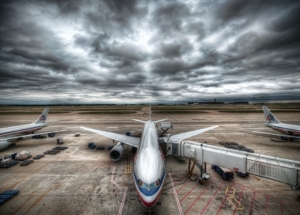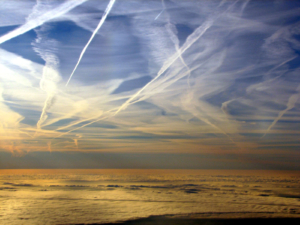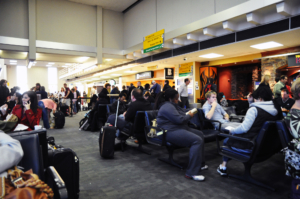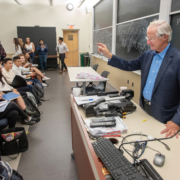#BanFlightsUSA, Before It’s Too Late!
by Brian Czech
In a rational world, we’d avoid doing things that rot our teeth, cause traffic accidents, or…ruin the planet for the kids, grandkids, and millions of other species. Unfortunately, our rationality has been spotty at best. We’ve been rational enough to protect plenty of teeth and prevent numerous accidents, but we’ve done nothing to stop the global heating that is wrecking our spectacular Earth.
That’s why we need to ban flights now.
We have to stop using aircraft for commuting, conferencing, vacations, visiting grandma, or flying merely for the “fun” of flying. We need to ban flights especially in the USA, our rapacious country where over a billion passengers[i] flew in 2019 (the last full year prior to the COVID pandemic). Only the Chinese, with over 650 million passengers that year, have come remotely close to the American consumption of flight services. A handful of countries in Europe, plus India, Japan, and Russia have hosted more than 100 million passengers. Flights in all the other countries occur at orders of magnitude lower than in the USA.
Already Too Late?
It’s too late to salvage the reliably refreshing temperate climate known to U.S. Baby Boomers, Gen X, and Millennials. It’s gone with the wind; just think what we’ve lost! The hot, sticky weather plaguing the USA this summer, as in all the recent ones, is just the beginning of brutal, relentless, life-threatening humidity. It’s embedded in the global climate system now, with record levels—and rapidly rising levels—of atmospheric CO2, methane, and nitrous oxide, the three biggest concerns among approximately ten significant greenhouse gases.

Aviation is the fastest-growing cause of global heating. (CC BY-NC-SA 2.0, Trey Ratcliff)
Americans need to wake up and start recognizing that climate change has impacts far beyond our comfort levels and ecological systems. It is rapidly becoming a threat to national security. With global heating already undermining entire cultures and threatening human health across the planet while Americans are flying in droves, how should we expect Asians, Latin Americans, Africans, and even Europeans to view us? Wouldn’t they think we’re a bunch of _______s? Readers can fill in the blank and ponder what that means for national security.
Then there’s Gen Z, outside and within the USA. Few of them have even taken a flight yet, but many of them know the climate is deteriorating because of the behavior and economic growth of previous generations, especially those frequent flyers in the 40+ crowd. What does that do for the democratic unity of a nation already wrought with dissension? Clashes between generations have historically been put in economic terms, but global heating stands to become the greatest point of dissension ever experienced among generations.
Many have wondered what the “Z” stands for in “Gen Z.” A financial advisor writing in Forbes thought it should stand for “Zombie,” a term that was widely adopted and quickly misinterpreted as some sort of psychologically meaningful analysis. In reality, it was just marketing lingo, designed to identify a new cohort for marketers and retailers to target. But why waste such alphabetical aptness of the letter Z? It’s the last letter in the alphabet, just like Gen Z may be the last generation before countries, cultures, systems, and societies collapse en masse. In that sense, at least, our young ones may indeed be zombie-like, walking ghosts of more-or-less civilized Homo sapiens.
So, there is a lot more at stake with global heating than purely its ecological effects (which would be profoundly catastrophic taken alone). Everything in the human experience from mere survivability to safety and comfort to social cohesion and international stability is in play. In the case of social cohesion and international stability, a tremendous amount is up in the air (no pun intended). A successful, democratic banning of flights in the USA would go a long way toward uniting citizens, generations, and countries in the fight against a common threat. And, while it wouldn’t save us from the ecological momentum (melting of glaciers, permafrost methane release, species extinctions, etc.) already in the works, it would be a substantial step toward stemming the momentum and stabilizing the environment.
Heads in the Sand, Bodies in the Clouds
Not many Americans—certainly not enough—think about climate change while downing those pretzels and peanuts on planes. Few of them probably know that flying only a few hours (New York to Chicago, for example) emits as much CO2 as months of car-driving. Not many ponder the fact that planes produce twelve percent of U.S. transportation-related emissions. Fewer yet think about the additional effects of contrails with their water vapor, nitrous gases, and sulfates. Heck, a third of them might not even “believe” (as if it were a matter of faith) in climate change. More on that in a moment.
Meanwhile, let’s not waffle in the weeds. Sure, the math is nuanced when we start comparing transportation apples to oranges. Is the flight to Chicago as impactful as six months of driving, or “only” four (but possibly eight or ten)? Sure, it depends which jet you take, latitude, altitude, the weather system at the time of flight, which car you’d be driving instead, how you accelerate, which pavement you drive on, how many raccoons you stop for, etc. Have at it if you’re detail-oriented. But don’t miss the 40,000 foot view for the contrails, because the biggest, most overlooked question of all is: When does all this insanity stop?

Contrails confounding CO2 emissions. (CC BY-NC 2.0, Roo Reynolds)
Do we stop flying before or after all the glaciers are gone, the ice caps have melted, the wheat belt has desertified, sagebrush has turned Sonoran, California chaparral is constantly aflame, half of Florida is flooded, CAFOs in the Carolinas are slopping into the surf, kudzu covers the East, and Burmese pythons have reached the Chesapeake inlets—and hamlets?
Think of that next time you fly.
The nonchalance with which flights are boarded by Americans is an indicator of a moral crisis stacked upon a public education breakdown. With a well-functioning educational system, basic models of the greenhouse effect would be common knowledge. Students would be graduating with the understanding that gas guzzlers, “sports” like NASCAR, and flippant flying are leading us clearly and directly into ecological hell. Conspicuous consumption of airline services—consider Tom Stuker for example—would be viewed virtually as a civil offense, impacting all of society and posterity.
We are obviously far from such understanding and attitude at the societal level. There is plenty of blame to go around—neoclassical economics, the airline and energy industries, and Dark Money for starters—but there are also signs of hope. One of the biggest is that, at long last, climate change is commonly covered by television meteorologists at national and local levels.
Flights are the Place to Start
Of course, the naysayers will tell you it’s “impractical” to even think of banning flights in the USA. Certainly the airlines and associated industries will fight it tooth and nail. But economic history is full of balking by industries and overcoming by societies. In the U.S. experience, think DDT, PCBs, and CFCs. All it takes, pursuant to the Constitution, is a majority of Americans supporting the ban, represented in good faith by their elected officials. (Albeit, due to the shortage of good-faith representation by American politicians, we’ll need more than just the barest majority of citizens.)
We have a decent head start, at least in understanding the problem. While half of Americans don’t think climate change will affect them, the other half do. Furthermore, I suspect there are plenty that actually do among the half that “don’t.” They just haven’t admitted it yet. We often think of conservatives as denying climate change, and rural folks as a significant element of the conservative base, yet any farmer, fisherman, logger or rancher worth their salt can feel, see, hear and smell the effects of climate change every day. Some of them may be duped thus far by misinformation, but they won’t be fooled for long.

Millions fly in and out of JFK, but at what cost? (CC BY-NC-ND 2.0, Caribb)
Meanwhile, the aforementioned television coverage is picking up steam (so to speak). On the August 23 edition of CBS Morning News, for example, meteorologist Jeff Berardelli clearly connected Hurricane Henri and the recent flooding in Tennessee to the effects of climate change. Upon further inspection, Berardelli has become somewhat of a Paul Revere on climate change. He’s helped empower local-station meteorologists across the country, especially at the CBS affiliates, to explicate the realities of climate change. For example, on August 24, meteorologist Chester Lampkin of WUSA9 (CBS’s Washington, DC affiliate) presented a two-minute, unequivocal segment, “How climate change is impacting the DC region.”
While the effects of runaway global heating—the scenario we should expect if we fail to mitigate—are absolutely nightmarish for the distant future, we have plenty of problems already from climate change. As our problem-recognizing majority grows, solutions become politically viable. As the existential severity of the problem is recognized, the solutions become bigger. This is no time to argue about microwaving vs. frying. We’ve got to think big, act big, and act fast.
In that light, let’s revisit the concept of practicality. What could be a more practical action that fits the bill of big and fast? Should we ban cars? Roll up the state and federal highways? Roll out gigantic strips of duct tape to keep the methane in the cracking-up permafrost? Build massive shelters around the glaciers and air-condition them? Envelope Earth in a giant canopy with adjustable transparency to fine-tune the amount of incoming solar radiation?
I don’t know about you, but I’ll take banning flights. It’s eminently doable and urgently essential.
If France Can Do It, So Can We
Four months ago France banned domestic flights on routes that could be traveled by train in under two and a half hours. Similar bans are under consideration throughout the EU, where 62 percent of citizens support them. Such bans are sensible, not only because train travel is a solid substitute for flying, but because a disproportionate amount of greenhouse gases are emitted during take-off and landing.
Yet when you think about it, who really needs to fly, no matter the distance? Especially with smartphones, Facebook, and Zoom?
It wasn’t that long ago—still in the memories of Baby Boomers—when hardly anyone outside the military flew at all. And, mere decades before that, the Wright Brothers were still monkeying around at Kitty Hawk. The world didn’t begin, in other words, when airlines were born. It won’t end when they go away, either. In fact, the American happiness quotient might actually increase. For many of us, airline travel has become more hassle than pleasure, and one fiasco at JFK Airport is equivalent in frustration to dozens of traffic jams.
How exactly do we ban flights in the USA? We need to work at it every bit as methodically as the Wright Brothers worked toward flight. They were mechanical entrepreneurs; we must be policy entrepreneurs. We need to build a Ban Flights for America the Beautiful Act, or BFAB. Here’s an opening line: “Congress finds and declares that airline travel is a substantial source of the greenhouse gas emissions threatening the nation and world with catastrophic climate change.” There, now we’re started, and we’ll take one step, one clause, one hurdle at a time, just as CASSE does with the Full Seas Act. We start with domestic flights—probably the shorter ones, phasing into long-haul flights over the decade—and call for a treaty limiting military maneuvers as well. It won’t be rocket science.
For a short, misguided time, it was fashionable in some circles, surprisingly near the center of the political spectrum, to speak of “American exceptionalism.” The meaning was drastically different, though, depending upon which president and followers spoke of it. In the midst of the COVID pandemic, the Afghan debacle, and the latest oppressive heat wave, we need to come back to Earth, figuratively and literally. It’s either that, or flirt with an existential threat. If that sounds like an exaggeration, take it from the Department of Defense.
The USA has been exceptional: exceptionally awful with its ecological and carbon footprints. Whereas, in better times, we were exceptional in science, politics, and diplomacy. That’s what we need to aspire to for the sake of the environment, the grandkids, and national security. We need to follow the climate science, devise the policy solutions, and parlay such progress into international diplomacy.
We need, in other words, to #BanFlightsUSA.
Footnotes
[1] “Passengers” in airline traffic jargon refers not to distinct individuals, but rather occupied seats.
 Brian Czech is the executive director of CASSE. Formerly at U.S. Fish and Wildlife Service headquarters, Czech was the lead author of Planning for Climate Change on the National Wildlife Refuge System.
Brian Czech is the executive director of CASSE. Formerly at U.S. Fish and Wildlife Service headquarters, Czech was the lead author of Planning for Climate Change on the National Wildlife Refuge System.









If you advocate to ban personal flights in USA why not to ban import from China? China is by most the biggest producer of CO2 and almost everything is now “made in China” and imported by cargo or aircraft. This simple rule – every product which is sold in USA has to be manufactured in USA would reduce CO2 emissions and also help to boost up the USA economy also with improvement in national security. Why not start with this?
Things from China are brought by boat, not plane…
Well, consider the source, but see here:
https://aviationbenefits.org/case-studies/why-china-relies-on-air-freight/
Evidently there’s quite a mix of air and sea transport.
I wouldn’t rule it out, Martin. Please join CASSE and help draft such a clause into the BFAB Act. Who knows, it could be the last clause left standing on the committee floor.
We also need to talk about space flight, and the thousands of low-orbit satellites that are emitting EMF to the earth, turning us into a microwave oven. Luckily, the US 10th Circuit Court of Appeals just ruled in favor of litigants Environmental Health Trust and NRDC against the FCC for its lax regulation of 4 and 5G and wifi. We may see some consciousness about this effect on climate.
Care to write an article on this for the Herald?
…not to mention obliterating the view of the stars and constellations that is our shared heritage and a natural right if anything is.
Ban flights to America the Beautiful is a good place to start cleaning up the atmosphere. I remember after the 9-11 attack in New York all flights were cancelled for 3 days and satellites showed the sky like I remembered it as a child. If we are to stop warming we have to start somewhere and this is a very good place.
“The sky like I remembered it as a child.” That resonates with me, Raymond.
Somehow we need to tap into more such wisdom-from-memory. Maybe in a book for the Steady State Press? Younger generations can’t quite know what they’ve missed. I feel this is a huge rip-off for them, and if they knew what they’ve been missing, more would be degrowthers and steady staters.
From Z to Gen S: https://theecologist.org/2019/mar/08/generation-symbiocene?fbclid=IwAR2kqz8-fWJHuDrBI7hSVZ1OHN79hMj2jhaCfUOJX0x9Dfj0hwprCXQUGb4
Interesting article. The Symbiocene sounds like the steady state economy, of epochal duration!
I appreciate the sentiment but I think we’d have more success and acceptance by attacking the root problem rather than playing whack-a-mole and pissing people off by saying “you can’t do that” over and over and over. Air transport is just one vector (Whack!!) bringing us climate change. There are many others (Whack Whack Whack!!!) that we would be constantly trying to stay ahead of and every whack!! pisses people off even more.
The root problem is emissions of GHGs. What if we try and address that directly by placing an economy-wide cap — which is reduced year-over-year — on emissions and then divvy-up the permitted releases? Each person can then choose how they will spend (or not spend) their personal allotment. Businesses would also need to buy credits to allow emissions. Businesses would also have to think about whether or not a particular business model makes sense given the decreasing allowances for emissions; leave it to the airlines, themselves, to decide to pack it in.
Though I’ve had this idea for quite a while, I found yesterday that DEFRA in the UK did a study about this quite some time ago and, looking further, I see it is quite a widely known and discussed path forward. Recent example from Nature.com. https://www.nature.com/articles/s41893-021-00756-w
Yes, but a disadvantage to that is institutional complexity and bureaucratic load.
I proposed caps at the wellhead in Supply Shock. Somewhat less complex; a very Dalyist and macroeconomic approach. I stand by that, too.
But meanwhile, banning flights is dirt simple. Not politically easy but technically simple. France already accomplished some.
As for “pissing off” people, the idea here is to turn those tables around, with remonstration against flippant flyers—see the Tom Stukker example—with the USA looking like the Stukker among nations. I see political viability there, if not for domestic policy, then in international affairs.
Hadn’t heard of him, but I’m guessing you are referring to this guy:
https://www.gq-magazine.co.uk/travel/article/tom-stuker-united-airlines
Yes, he is the sort of fellow that needs to pay for all those emissions; that is, pay others to buy their carbon allocations and let others make money off of him. And, if no one wants to sell him their allocation, then he’s grounded!
Similar would be those with yachts (ocean and land), large and super-sized, who pay nothing for their emissions.
I haven’t finished reading the details of the DEFRA study on personal carbon allocations but such a system wouldn’t be re-inventing the wheel. Some basic things would be easy: e.g. buying fossil fuels. Perhaps even carbon capture (though I’m no fan of geo-engineering). Others would be trickier to account for: e.g. land-use, resource extraction, harm to other species (and I’m sure other things that I’m not yet aware of). I’d also like to learn the reasons it did not proceed.
Generally, I’d favour the approach of taxing/rationing things that are known, scientifically, to be harmful, rather than banning activities per se.
Here are some belated observations on French trains (I’m sure this is not news to you, Brian):
1. Trains have a long history for mass personal travel in Europe and rails there are mostly for passenger traffic.
2. TGV has been around for quite some time now, as has high speed rail in other countries, and is part of the culture. And it’s great!
3. Convenient inter-modal connections (i.e. train stations at airports, several train stations in major cities inter-connected by metro) are common.
3. With that mindset in place amongst the public and that built infrastructure in place, cancelling short-haul flights in France, or elsewhere in Europe, would not be a huge shift, I don’t think.
4. The situation is very different in North America, at present, where the rails are primarily for freight, inter-city distances are generally longer & the mid-continent is spread-out.
Concerning caps at the wellhead, that is a vital component for climate policy regarding fossil fuels. But the policy needs to be broader than that, so that it provides for socioeconomic adaptation to the cap. Otherwise government policymakers and the public are unlikely to gain the confidence necessary to accept a strong, fast-declining cap.
Here’s an article on “Cap and Adapt” policy, in Solutions Journal last fall: https://thesolutionsjournal.com/2020/09/01/cap-and-adapt-failsafe-policy-for-the-climate-emergency/
There is a good PDF copy here: https://radreduction.org/2021/02/12/a-specific-proposal-for-the-managed-decline-of-fossil-fuels-in-rich-high-emitting-nations/
Glad you mentioned trains. First, give folks an alternative to short distance flights. That would be faster trains, much more frequent, reliable, and with many connections that are easy to make. Make train travel more attractive. That’s a climate solution if we can build it out now and within the next decade. Ultra high speed would be nice too but it cannot be built within this decade in most situations because it requires all new dedicated right of way – not going to be operational for decades. We don’t have decades. We need to move traffic – freight and passenger – to rail now. Please tell your Senators and US Reps that we need rail infrastructure funding in the Budget Reconciliation bill as climate infrastructure. Fact: Rail uses 2/3 less energy than roadway traffic, and emits 2/3 less GHG even when burning diesel – none when electrified. Roadway traffic is 82% of the national climate emissions from transportation; air traffic is only 9%. So start with moving roadway traffic, and provide a viable alternative. Then it will make more sense to phase out short distance air travel. http://www.climaterailalliance.org and on FB. And see new released book The Climate Emergency: Trains – An Effective Response at http://www.vtd.net
Good points all, and thanks for the links!
Thanks Brian for calling out the rapacious damage airline flying does to the planet.
You are completely correct, but most of our society would barely consider, let alone agree with your position.
I think the public mood on this issue is probably lagging behind you by at least 10 years.
You’re also correct in posseting that the means to tackle this laissez-faire public attitude on the issue is to bring it into the public discourse. And you’ve thrown the hat into the ring!
Good on you mate!
Peter,
Australia
Peter, you hit the nail on the head, and thank you for doing so.
Yes, we suffer no delusions that a BFAB Act would pass in this Congress, but as you say, it’s got to be brought into public discourse. It’s a center-pulling approach that makes it easier for less ambitious (but still worthy) campaigns to succeed.
And, the first draft of the BFAB bill will offer gradations/phases, starting with the banning of short domestic flights (as in the French example).
An additional way to bring the climate harms of flying into public discourse is to advocate for a fast phase out of frequent flyer programs (FFPs). If advocated strongly this will generate controversy and lots of adverse publicity about flying – especially in the U.S.
You may be surprised by how deeply FFPs have penetrated into the US, UK and European economies, particularly where “free” miles from credit card use is involved. See this short but comprehensive article by @StayGroundedNet, from September: https://stay-grounded.org/frequent-flyer-programmes-incentivise-climate-destruction/.
Why is government allowing the highly harmful practice of flying to be grown, glorified, incentivized and subsidized by FFP programs? It makes no sense.
Did you know that most airlines make 40-50% of their profits from the FFP? And that American Airlines for several years running lost money on its actual flight biziness, and was in the black only because of its FFP (AAdvantage)?
I’m all for this. Quite honestly I find flying to be an enormously uncomfortable hassle, and something to be avoided if at all possible. I am profoundly grateful for things like Webex and Zoom, which started displacing “business travel” a few years ago at the company where I work.
I would love to see the G8/G20 leaders start switching to virtual meetings, as a way of showing leadership by example on climate.
The reason I like the idea of steady state economy is that it encourages change through the use of the economic system. I think banning flights is a bad idea, what next and necessary service would we ban?
Instead use the economy to promote innovation and repair to the environment.
Airline cause X damage – then put pollution and resource consumption into the cost of the item.
Businesses with then focus on how to use less resources and pollute less springing of better technologies and activity repairing damage to the environment.
Outright bans miss the point that Herman Daly was making and the opportunity to force change on industry.
Great article! In the US it is especially important to promote the importance and value of railway systems – that they are neglected and not commonly considered as a form of travel across the country is a shame! #GroundedTravel provides opportunities to see and do much more than a quick, highly polluting flight!
If you are a local organization working against airport expansions/pollution or the wider impacts of aviation/a profits over people paradigm, consider joining the Stay Grounded Network – get in touch with us at [email protected]
Couldn’t agree more. Flying is incredibly polluting and frequently if not usually the travel is for pleasure and not a necessity in any way. This is the low-hanging fruit of climate catastrophe avoidance. I stopped flying 10 years ago and feel awesome about it.
“Should we ban cars? …”
Yes, a thousand times YES.
Vehicular collisions are one of the leading causes of death of young people globally. Personally, as a pedestrian and cyclist, I fear cars *much* more than airplanes.
Noise pollution from motor vehicles (in addition to being bloody annoying to the apparently few of us who aren’t habituated to it) is a public health crisis in itself, as well as detrimental to many other species by causing stress and hampering communication.
Speaking of public health crises, how about obesity, heart disease, diabetes, and other ailments resultant from physical inactivity? Replacing useless driving with intrinsically rewarding active transportation would help with all that.
And perhaps most revolting of all is the amount of land destroyed for parking lots and other infrastructure, utter ecological wastelands that needn’t exist at all but for car culture. (And then what little habitat remains is fragmented by deadly freeways and blighted by road noise.)
Mining of lithium, cobalt, and other minerals for EV batteries is becoming a new source of ecological destruction, not to mention the destruction that will caused by the energy infrastructure needed to charge them (including “renewables”).
While driving is characteristically stressful and annoying, walking and cycling are activities that people often pursue for pleasure. (Ever hear of “footpath rage” or “bike trail rage”? I’ve not.)
Cars and freeways detach the commuter from their community and natural environment, and in turn foster the toxic view that some land exists merely to be passed over, not as a place that was once special and sacred in its own right. Walking, whether through a neighborhood the woods, fosters connection and a sense of place.
If American bans the flights would-be expats were counting on, the country should at least strive to become a half-way pleasant to live for those thereupon fated to remain groundbound. Banning cars would help would that.
There are better ways other than banning undesirable activity.. Your reputation defines who you are, what you stand for and where you stand among your peers.Here In Ireland villagers of old cooperated and did one another a good turn. The custom of being helpful to your neighbours continues particularly in the countryside. It was essential for survival. Your reputation was everything because if you had a bad unhelpful reputation no one would help you in a time of grave need. Everyone knew everyone there was nowhere to hide from a tarnished reputation left out of dealings, economically weakened. Cave men and women had to cooperate for survival, Our historic evolutionary apes had to cooperate for survival. It’s in our DNA, let’s harness it.Cooperation for survival only works well when hand in hand with a visible reputation.. HOWEVER in the modern age we dont need to cooperate so much and reputations aren’t visible as in an old Irish close knit village. Air travel reduction ìs an opportunity where a cloud based visible personal reputation app could be developed – a spin off of Waze perhaps. Consumers could track and share their travel carbon footprint. They display current green status on email footer or on online profile info. It becomes adopted early and voluntarily by ethical cooperators, with the mainstream following not wanting to be suspected of being polluters. At this point some abusers will continue to over pollut to the dismay of the behavingmajority. majority should then be enforced. Compulsory carbon tracking for all.. Restricted air travel, maybe if you choose to cycle as daily transport an additional right to fly could be earned. I feel that if you threaten early legislation it’s like the story of the wind trying to blow your coat off. We need to shift the culture so that consumers are voluntarily compliant in order to enhance theirreputations which they are proud of. Proud to leave the planet in great shape for their descendants.